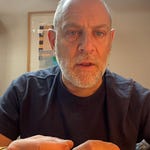What does it mean to see the world through the eyes of Jonah, a runaway prophet deep under water inside the belly of a big fish?
Many mystics and poets have pondered this biblical story about what it takes to wake up to help a world in need of all our eyes and voices.
As the Christian world begins its Season of Lent this week, including many of our readers, and is this awful war continues to ravage lives and hopes in Gaza and in Israel I’d like to bring a very different perspective today to our weekly reflection of Below the Bible Belt:
A Palestinian Feminist Reading of the Book of Jonah, written a few years ago by Rev. Dr. Niveen Sarras who is Luthern pastor, born and raised in Bethlehem, Palestine.
Her painful and profound reading helped me see this story from a totally different angle and I’m deeply grateful to this gift that I would love to share with you. Rev. Dr. Sarras writes that:
“One of the ways to interpret the text is to look at the book from the eyes of minorities who do not fit in the structure of the imperial power of their world.”
Jonah lives in a mythic moment, yet the big city he is sent to is Nineveh, the fabled big city of the near east, the capital of the Assyrian Empire. He is a member of a persecuted minority sent to the headquarters of the enemy nation to tell them to change their ways?? Who would do that? Earlier this week we read a commentary by Robert Alter who compared this to an American Jew going to demand atonement from Hitler in Berlin in 1936. Sarras sees this from the side of Palestinian, and through the eyes of a Feminist reading as well. She writes:
“My first claim is that minorities who live under the oppression of dominant power can see themselves in the character of the prophet Jonah. The second claim is to try to find women’s voices in the book of Jonah...
Palestinian feminist reading of the book of Jonah displays how YHWH calls minorities and oppressed peoples to change their situation and to challenge their oppressors...
..Jonah’s is a dangerous commission, to go to those who might kill him! Now let’s look at Jonah’s dilemma through minority eyes, for instance from the perspective of the plight of the Palestinian people who are being dispossessed of their lands and systematically marginalized and oppressed by the powerful state of Israel. Imagine then, a contemporary scenario mirroring the book of Jonah where YHWH appears to a Palestinian and asks him to go to the state of Israel and prophesy against her because her sins have come before YHWH.
This new prophet will likely be scared to go to Israel and fulfill his mission because he is aware of the dangers Palestinians have to face there. He could be arrested by the soldiers and thrown in prison, especially if he enters the state of Israel without a permit. It is easy to imagine why he might try to run away from his commission, like Jonah. Perhaps, Jonah too had some concern for his safety.
As a minority person, I understand the book of Jonah as a book that depicts YHWH as a God of chances. YHWH is willing to forgive and to give a new chance to the oppressors when the oppressors repent. YHWH used Jonah, whose people were oppressed by the Assyrians, to challenge the imperialist power of Assyria. That means YHWH can use the powerless people to transform the oppression of the oppressors and to help them to improve and amend their behavior. The book of Jonah empowers minorities and encourages them to believe that they can bring about change in their lives and even in the life of their powerful oppressors.
It could be said that he used a nonviolent method to transform the behavior of the Ninevites and to change their minds and hearts. Therefore, the book of Jonah models nonviolence as a powerful approach for minorities to challenge their oppressors.
This reading motivates me to use the compassion that God created in me to challenge the structure of the Palestinian patriarchal society and at the same time to challenge Israeli oppression. Being a woman does not mean that I am weak. God can use underprivileged persons such as myself and my Palestinian sisters to challenge the dominant powers and structures in our society and lead the entire Palestinian society to repentance and transformation.”
However you choose to interpret the biblical story of Jonah, it is upon us to wake up to the ways with which the world continues to inflict pain by using power and it’s on us to help. Jewish tradition chose to locate Jonah on the Day of Atonement - a reminder to each of us and to our collective responsibility as a people to do what we can to change our ways and change this world, for better, however we can.
I am grateful to the teaching of Rev. Dr. Sarras and the important lessons she is teaching us today. I hope we all finds ways to walk the talk of peace and compassion, courage and justice, hope and healing - with all people, on this and every day.
May the Lent Season, leading us into Easter, Ramadan, Purim and Passover - bring us all closer together to our sacred source, and to our truths, and help us help each other heal.
Shabbat Shalom












Share this post